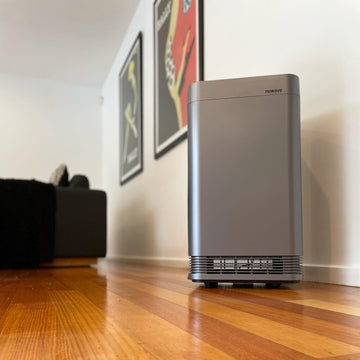Introduction:
In the ever-evolving landscape of indoor air quality, the quest for cleaner and healthier air has led to the proliferation of air purification technologies. Among the myriad options available, two prominent players stand out: the conventional air purifier and its specialized counterpart, the HEPA portable air purifier. In this comprehensive exploration, we will dissect the differences between these two devices, shedding light on their unique features, functionalities, and the impact they have on the air we breathe.
Understanding the Basics:
To comprehend the disparity between an air purifier and a HEPA portable air purifier, it is crucial to grasp the fundamental principles governing their operations.
An air purifier, in its general sense, is a device designed to remove contaminants from the air within a confined space. It typically employs various technologies such as filters, electrostatic precipitators, or UV light to capture or neutralize particles like dust, pollen, and volatile organic compounds (VOCs). The primary goal is to enhance indoor air quality by reducing the concentration of pollutants.
On the other hand, a HEPA portable air purifier is a specialized variant that relies on High-Efficiency Particulate Air (HEPA) filters. HEPA filters are renowned for their exceptional ability to trap microscopic particles with a high degree of efficiency, making them a popular choice for individuals seeking superior air purification.
Key Distinctions:
-
Filtration Mechanism:
-
Air Purifier: Conventional air purifiers employ a variety of filtration mechanisms, often including HEPA filters but not exclusively. They may also integrate activated carbon filters, UV-C light, or electrostatic precipitators.
-
HEPA Portable Air Purifier: As the name suggests, these devices primarily utilize HEPA filters, which are highly effective at capturing particles as small as 0.3 microns with an efficiency of 99.97%. This specialization makes HEPA portable air purifiers exceptionally proficient in removing allergens and particulate matter.
-
-
Particle Size Range:
-
Air Purifier: Depending on the specific technology employed, the particle size range captured by conventional air purifiers may vary. While many can handle larger particles effectively, their efficiency in capturing ultrafine particles may be limited.
-
HEPA Portable Air Purifier: The hallmark of HEPA filters is their capacity to capture particles as small as 0.3 microns. This includes common allergens like pollen, pet dander, and even microscopic bacteria, setting them apart in terms of comprehensive filtration.
-
-
Portability:
-
Air Purifier: Traditional air purifiers are often designed for fixed installation within a room or a specific area. They are not easily portable, limiting their flexibility in addressing air quality concerns across different spaces.
-
HEPA Portable Air Purifier: As the name implies, portability is a defining feature of these devices. Compact and lightweight, they can be moved from room to room, providing targeted air purification wherever needed. This makes them ideal for individuals who prioritize versatility and flexibility in their air purification strategy.
-
-
Application and Room Size:
-
Air Purifier: Conventional air purifiers are available in various sizes and capacities, making them suitable for different room sizes. Larger models may be required for more spacious areas.
-
HEPA Portable Air Purifier: While generally compact, these devices are versatile and can effectively purify the air in smaller to medium-sized spaces. Their portability allows users to deploy them strategically based on changing air quality needs.
-
Conclusion:
In the pursuit of cleaner and healthier indoor air, the choice between an air purifier and a HEPA portable air purifier boils down to specific needs and preferences. Conventional air purifiers offer a range of technologies, suitable for various applications, while HEPA portable air purifiers excel in comprehensive particle filtration and portability.
As we navigate an era where air quality is of paramount importance, understanding these distinctions empowers consumers to make informed decisions based on their unique requirements. Whether opting for the versatility of a conventional air purifier or the targeted efficiency of a HEPA portable air purifier, the ultimate goal remains the same: breathing air that promotes well-being and vitality.
Selecting the ideal air purifier for your home? Opt for Nuwave OxyPure Series, America's most trusted brand.

